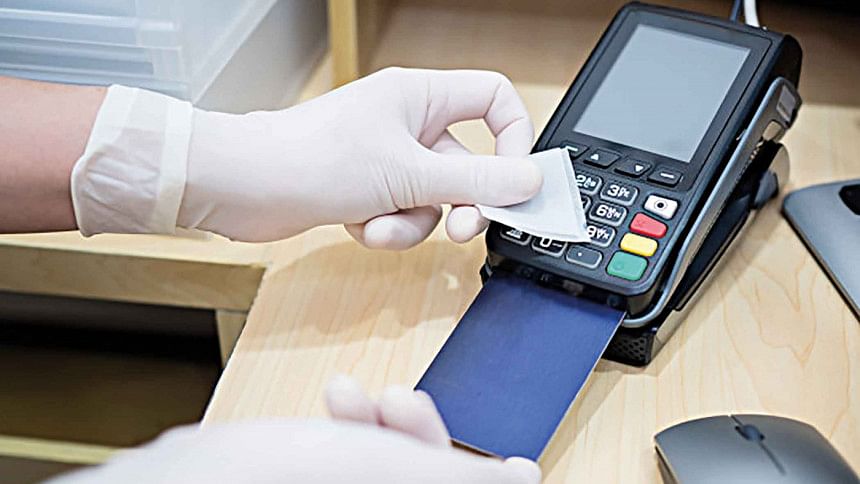Cards after Covid-19

It was April when the government was compelled to enforce a lockdown across the country to keep the coronavirus pandemic at bay.
"This was an unprecedented experience for everyone. And, I was afraid of purchasing essential stuff by going to a shop in person. But a plastic card brought me great relief," said Sadrul Ahmed Ripon, an executive of an insurance company.
This helped pay for products which were ordered online during the pandemic, he said.
But, trouble was not over as the next problem emerged: how would the credit card bill be settled?
"Then I phoned the customer care of my bank. They instantly disseminated a solution to resolve the crisis, which was nothing but a mobile application," he said.
"I had a bit of an idea about the window, but was not used to doing so before the pandemic."
A large number of retail transactions including the payment of card bills can be paid for through the app, from the comfort of one's home.
"Despite having a credit card, I did not use it frequently before the ongoing pandemic. But, now I am highly dependent on the digital tool to live my life, avoiding to use the physical currency to a large extent," Ripon said.
Many like Ripon have started to embrace both credit and debit cards to make their lives easier.
The latest central bank data also indicates the same.
Transactions through credit cards rose 23.68 percent year-on-year to Tk 1,244 crore in September. The number of transactions also increased 12.60 percent to 21.19 lakh.
Debit card transactions also saw the same positive growth in September as clients spent Tk 15,211 crore, up from 14.59 percent year-on-year.
The number of transactions through debit cards also went up to 1.91 crore in September in contrast to 1.85 crore a year ago.
"Transactions through cards are easy, so people are flocking to digital tools. The trend will get more momentum in the days ahead as the pandemic has created a habitual attitude to do banking at their own convenience instead of going to the bank," said Mashrur Arefin, managing director of City Bank.
The lender has enjoyed magnificent growth in digital banking in recent months, of which major portions have been settled by clients through credit cards, he said.
City Bank is the top player in the country's credit card market. It has issued around 5 lakh cards.
Although cross-boundary transactions have almost halted, the settlement of transactions through cards has been on the rise in the domestic market, Arefin said.
Online transactions in City Bank have recently increased almost five-fold, compared to the pre-Covid-19 levels.
For instance, education and online fees experienced a growth of 185 percent this year relative to the volume of last year.
"We have already restored 87 percent card business given the benchmark of pre-pandemic state of affairs," Arefin said.
The bank now issues around 4,500 credit cards per month in contrast to 5,000 in February.
Mutual Trust Bank has also had the same experiences as it issued 3,000 credit cards last month, which is the highest in a month, said Md Shafquat Hossain, head of SME and retail banking division at Mutual Trust Bank.
The issuance of supplementary cards recently gained a lot of momentum as cardholders now offer the facility to their near and dear ones.
As much as 40 percent new cardholders now choose the supplementary credit cards in contrast to 10-15 percent during the pre-pandemic situation, Hossain said.
MTBL has so far issued 55,000 credit cards and 270,000 debit cards.
Mahiul Islam, head of retail banking at Brac Bank, said clients now prefer credit cards more and more as they are reluctant to visit shops physically.
In addition, card-not-present (CNP) transactions have been on the rise, having a positive impact on the lifestyles of people, he said.
A CNP transaction occurs when neither the cardholder nor the credit card is physically present at the time of the transaction. It is most common for orders that happen remotely — over the phone or by internet or mail.
Brac Bank, one of the top largest card issuers in the banking sector in Bangladesh, is also enjoying an upward trend in transactions through credit cards.
Transactions through credit cards for purchasing grocery items and food deliveries increased to a great extent during the lockdown period, said Ahsan Ullah Chowdhury, head of card and digital banking at Eastern Bank.
Eastern Bank, another top largest player in the card industry, enjoyed as much as 400 percent growth in the field of settlement of transactions for grocery items, food deliveries and pharmaceutical items.
Tech-savvy clients will prefer credit cards in the days ahead as the central bank has recently imposed ceiling on the interest rate of the product, he said.
On September 24, the central bank capped the interest rate on credit card loans at 20 percent such that clients will get rid of the burden of higher interest amid the pandemic.
Banks earlier charged between 25 and 27 percent interest on credit card loans.
Chowdhury, however, laid emphasis on the need of strengthening the financial literacy among clients so that they can prevent themselves from fraudsters.
The next year will be more challenging for the card business as the loan moratorium facility will continue until December, he said.
Many cardholders will become defaulters when the payment holiday is lifted.
Banks issued 16,19,788 credit cards as of September, up from 10 percent year-on-year when the number of credit cards rose 16.37 percent to 2.02 crore, data from the central bank showed.

 For all latest news, follow The Daily Star's Google News channel.
For all latest news, follow The Daily Star's Google News channel. 



Comments